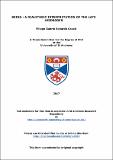Being : a dialetheic interpretation of the late Heidegger
Abstract
In my thesis, I present a novel interpretation of the so-called second
Heidegger. In the first chapter I discuss the paradox of being, according to
which talking and thinking about being leads to a contradiction. I also show
that the late Heidegger endorses dialetheism, accepting the contradiction of
being as a true one. In the second chapter, I present a comparison between
Heidegger and Meinong. First of all, I discuss some similarities between
Heidegger’s account of intentionality and Meinong’s account of intentionality,
and Heidegger’s ontology and Meinong’s ontology. Secondly, I interpret
Heidegger’s being as a special case in Meinong’s ‘Theory of Objects’. In the
third chapter, after showing that, according to Heidegger, being is identical to
nothingness, I present a paraconsistent mereological system that makes
formal sense of Heidegger’s metaphysics. In this mereological system, the
totality is taken to be the mereological sum of everything that is and the
complement of the totality is interpreted as nothingness, namely what we
obtain removing all things from the totality. Since, according to Heidegger,
nothingness is being, the complement of totality is taken to be being as well.
Finally, in the fourth and last chapter, I discuss Heidegger’s theory of
grounding. I show that the early Heidegger endorses a particularly strong form
of foundationalism. Moreover, I present two paraconsistent versions of
foundationalism (called para-foundationalism 1.0 and para-foundationalism
2.0) that can accommodate the inconsistent views endorsed by the second
Heidegger.
Type
Thesis, PhD Doctor of Philosophy
Collections
Items in the St Andrews Research Repository are protected by copyright, with all rights reserved, unless otherwise indicated.

